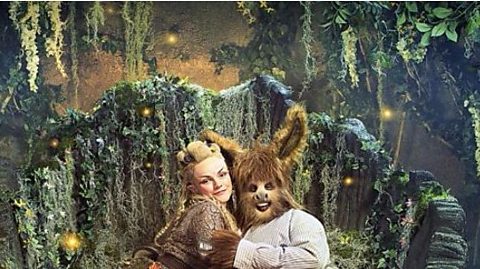Not of an age, but for all time
Shakespeare is EnglandÔÇÖs most celebrated dramatist and poet. His works have been translated into 80 languages, including Star TrekÔÇÖs Klingon. He helped shape the English we use today, introducing up to 300 words and dozens of well-known phrases.
His plays are known around the world for their universal themes and insight into the human condition. Yet much about the playwright is a mystery. Historians donÔÇÖt know his date of birth, where he was educated or how he spent seven years of his life.
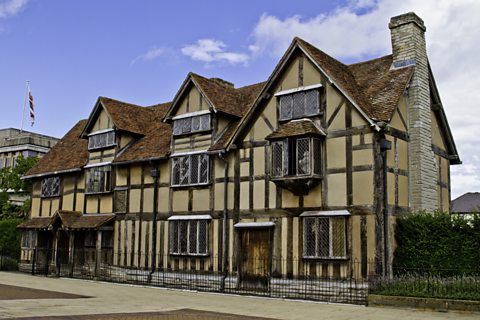
26 April 1564
William Shakespeare christened
There is no record of ShakespeareÔÇÖs birth, but his christening is recorded. It was usual for christenings to take place on the third day after birth.
He was born during the reign of Queen Elizabeth I, who had recently converted England to Protestantism. ShakespeareÔÇÖs parents had been Catholics, and the tension between the new and old religions can be seen in much of his work. WilliamÔÇÖs father, John Shakespeare, was a member of the borough council of Stratford-upon-Avon. William was the third of eight children, though his two elder siblings did not survive childhood.

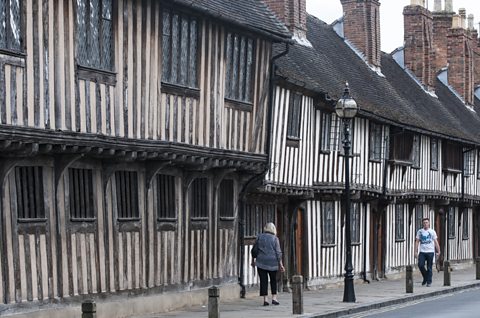
1571
ShakespeareÔÇÖs education
Details of ShakespeareÔÇÖs schooling are unknown. It is likely that he began his education at the age of six or seven.
As his father was now a bailiff, young William probably attended the local grammar school. Its curriculum emphasised Greek classics and pupils also learned plays in Latin. Religious education was also important, and Shakespeare drew on these sources in his later work with classical and religious allusions. Shakespeare probably attended school until about age 15. There is no record of him going to university.

1585-1592
Marriage and the lost years
Shakespeare married the 26-year-old Anne Hathaway, in 1582 when he was 18. She was already three months pregnant with their first child.
The baptisms of his three children are the last record of him for seven years, known as his lost years. At some point Shakespeare went to London, leaving his family in Stratford, and established himself as a playwright and actor. Some claim he worked as a teacher, an apprentice butcher or a lawyerÔÇÖs clerk. A century later his first biographer suggested he fled to London to escape punishment for deer poaching. However, no records have been found of his activities in these years.
Francesco da Mosto investigates how plausible it is that Shakespeare could have visited Venice. Shakespeare in Italy (┤¾¤¾┤½├¢ Two, 2012).
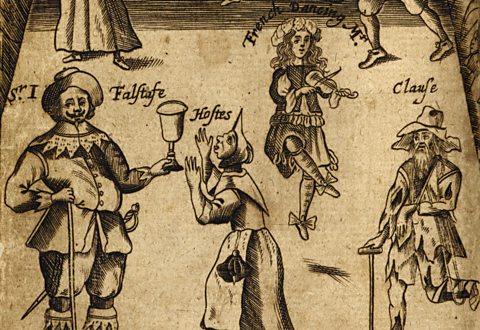
1592
ShakespeareÔÇÖs first review
The next known record of Shakespeare appears after he was already a playwright in London. It's a review ÔÇô and not a positive one.
Playwright Robert Greene called Shakespeare an "upstart crowÔÇØ, accusing him of reaching above his rank compared with university-educated writers such as Christopher Marlowe and Greene himself. Drama in Elizabethan theatre shifted from the religious to the secular and companies of players formed to entertain the public under the patronage of noblemen. Shakespeare belonged to the Lord ChamberlainÔÇÖs Men. He is thought to have written the three parts of Henry VI and Richard III by this point.

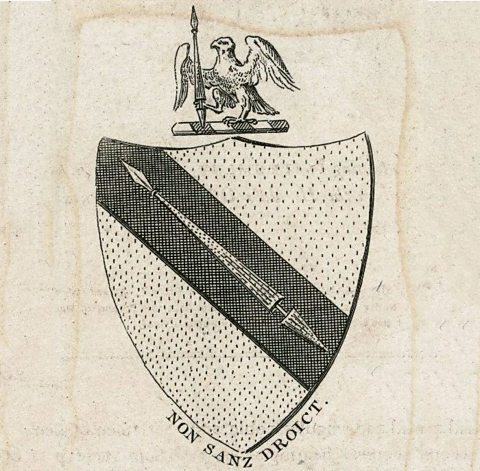
October 1596
Shakespeare becomes a gentleman
William is thought to have revived his fatherÔÇÖs lapsed application for a family coat of arms in 1596.
Scholars suggest the application showed he was now a successful businessman as much as a talented playwright. In 1602 he had to defend his title against accusations that ÔÇ£Shakespeare ye playerÔÇØ did not merit the honour of a coat of arms. By this time Shakespeare's company had performed Romeo and Juliet, Richard II and a Midsummer NightÔÇÖs Dream.

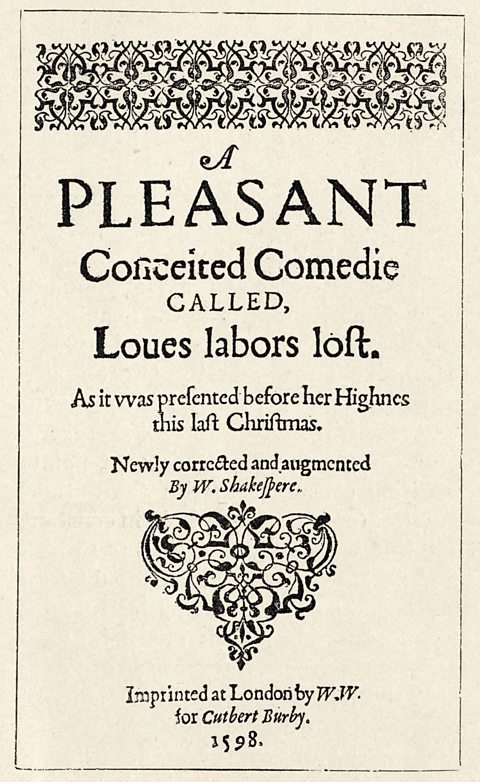
1598
Shakespeare is credited on his own work
In 1598, Love's Labour's Lost was Shakespeare's first work published with his name on the title page, suggesting it was now a selling point.
That year the author Francis Meres singled him out from a group of English writers as "the most excellent" in both comedy and tragedy. His work attracted royal attention; he acted in several performances before Queen Elizabeth I. Some academics suggest that his history plays were supportive of ElizabethÔÇÖs claim to the throne. Others suggest Richard II criticised her as it describes the overthrowing of a monarch.

1599
Building the Globe
ShakespeareÔÇÖs plays made him both famous and wealthy. By now he was a shareholder in the Lord ChamberlainÔÇÖs Men.
The group built their own theatre called the Globe, and Shakespeare owned a 12.5% stake. This made him even wealthier. He invested in property in Stratford and London, and records of his purchases survive. In 1597 he bought the second biggest house in Stratford for his family, as well as 107 acres of farmland and a cottage. Later, he bought property to let in London, showing his business acumen.
James Shapiro on the building of the Globe. The king and the playwright: A Jacobean history (┤¾¤¾┤½├¢ 4, 2012).
1603
Royal patronage
After Elizabeth I died, ShakespeareÔÇÖs company was awarded a royal patent by King James I (VI of Scotland), and became the KingÔÇÖs Men.
King Lear, probably composed in this year, took divided kingdoms as its theme mirroring James I's new domain of England, Scotland and Wales. Meanwhile Macbeth, also written early in James's reign, gives a kind portrayal of JamesÔÇÖs ancestor Banquo and was probably intended to honour the new kingÔÇÖs Scottish ancestry.
James Shapiro explains the changes Shakespeare faced after King James took the throne. The king and the playwright: a Jacobean history (┤¾¤¾┤½├¢ 4, 2012)
1613
Shakespeare writes his last play
The Two Noble Kinsmen was possibly the last play Shakespeare worked on. He wrote it with a collaborator, John Fletcher.
In the previous decade he had written his late romances - Cymbeline, The Winter's Tale and The Tempest. These plays are graver in tone than the comedies of the 1590s but less so than the tragedies, as they end with reconciliation and forgiveness for potentially tragic actions. This change of mood may simply reflect the theatrical fashion of the day, but it could also be evidence Shakespeare had developed a more temperate view of life as he aged.
The Tempest was one of the last plays Shakespeare wrote. Shakespeare Uncovered: Trevor Nunn on the Tempest (┤¾¤¾┤½├¢ 4, 2012).
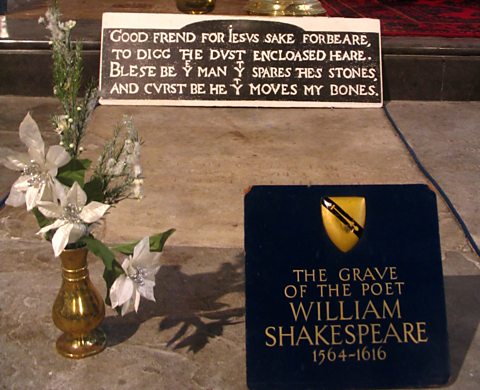
23 April 1616
Shakespeare dies
There are no contemporary accounts of ShakespeareÔÇÖs death, though he made his will a month before he died, in which he says he is in ÔÇ£perfect healthÔÇØ.
Fifty years later the vicar of Stratford-upon-Avon wrote that Shakespeare died of a fever contracted after a ÔÇ£merry meetingÔÇØ where he ÔÇ£drank too hard.ÔÇØ His will contains some insight into his property. For unknown reasons, he left his wife his ÔÇ£second best bedÔÇØ. He was buried in Stratford and his grave featured a stone-carved bag of grain to represent his familyÔÇÖs traditional occupation.

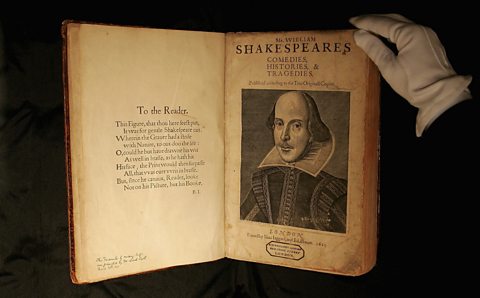
1623
First Folio published
Seven years after he died, a collection of ShakespeareÔÇÖs writing was published. This was by far the most complete version of his work.
It was compiled by his friends John Heminge and Henry Condell. It contained 36 plays, including 18 never before printed. A few are missing, including Cardenio. Many of them had appeared as quartos: flimsy books made from folded paper, which the First Folio described as "stol'n and surreptitious copies." This was possibly to encourage purchase of the collected volume. Around 750 copies were printed of which 233 are known to have survived. In 2006 a copy of the First Folio sold for £2.8m.

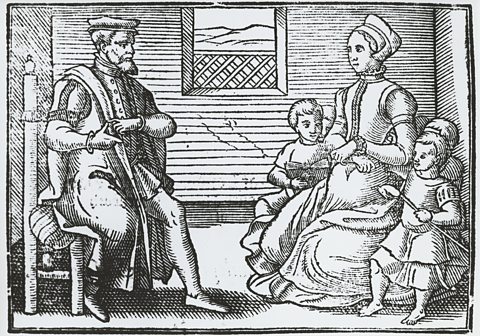
1644
The Globe shut down and demolished by Puritans
The Puritans ÔÇô a powerful group of protestant Christians who had gained power - outlawed plays and theatres in 1642.
Two years later, the Globe was demolished. Anyone caught performing a play was seized and whipped and anyone caught attending a play was fined. The work of Shakespeare ÔÇô and his contemporaries ÔÇô was no longer performed in public. It wasnÔÇÖt until the Restoration of Charles II in 1660 that plays were legalised again.

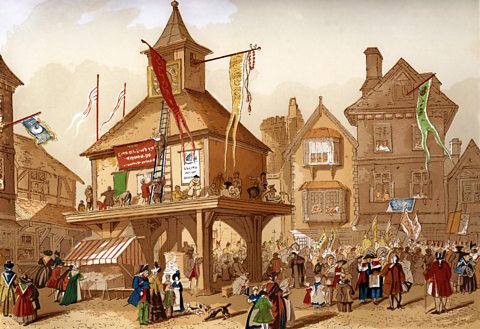
1769
Jubilee celebrations
Shakespeare's work was performed throughout the next hundred years as his fame and reputation grew throughout the country.
Samuel Johnson quoted ShakespeareÔÇÖs work thousands of times in his English dictionary, published in 1755. He noted Shakespeare coined or introduced thousands of words and phrases into the English language. In 1769, ShakespeareÔÇÖs life was celebrated in a jubilee organised by actor David Garrick. It was a hugely anticipated event, with the papers reporting all aspects of it during the preparation. Shakespeare had become famous, though no Shakespeare plays were performed at the Jubilee due to rain.

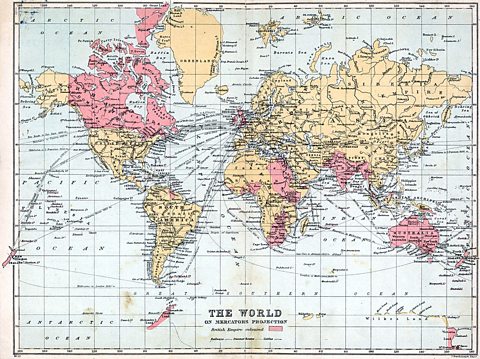
1841
Shakespeare and the Empire
In the 19th Century, Shakespeare became an important emblem of national pride, used to spread the influence of British imperial power.
Taught in schools across the Empire, Shakespeare's work helped to imbue a sense of cultural patriotism in the EmpireÔÇÖs subjects. In 1841 Thomas Carlyle described him as a ÔÇ£real, marketable, tangibly useful possession.ÔÇØ Post-colonial literary critics have argued this was a way the British Empire tried to subordinate the cultures of the countries it occupied. Shakespeare continues to be exported, adapted and translated, across the world.

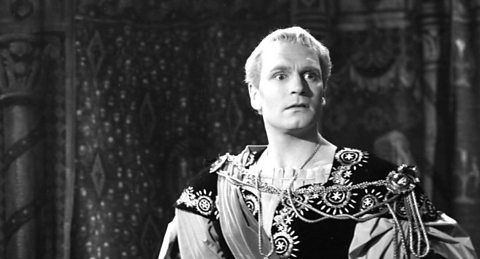
1899
Shakespeare on film
With the emergence of film, ShakespeareÔÇÖs plays could be explored in new ways. The first Shakespeare film was made in 1899.
The film was a simple photographic record of a small part of a production of King John. Decades later came the first film masterpieces of Shakespeare, including Laurence OlivierÔÇÖs Henry V, Hamlet and Richard III. Later films, such as Akira Kurosawa's Throne of Blood (1957) and Baz LuhrmannÔÇÖs Romeo + Juliet (1996) were more experimental. With over 400 film adaptations, the Guinness Book of Records lists Shakespeare as the most filmed author.

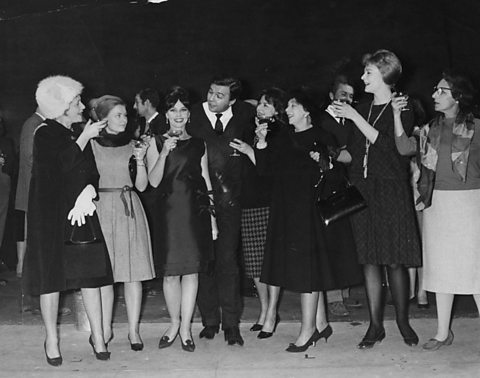
20 March 1961
Royal Shakespeare Company formed
The Royal Shakespeare Company (RSC) was chartered in Stratford-upon-Avon and operated out of the 30-year-old Shakespeare Memorial Theatre.
The first director of the company, Peter Hall, wanted to offer both traditional and innovative performances of Shakespeare. Royal support carried on the tradition of patronage from ShakespeareÔÇÖs lifetime. The RSC innovates with touring workshops and experimental productions, including puppetry. Stratford itself benefits from its connection with the Company and Shakespeare's legacy, receiving nearly five million tourists a year.

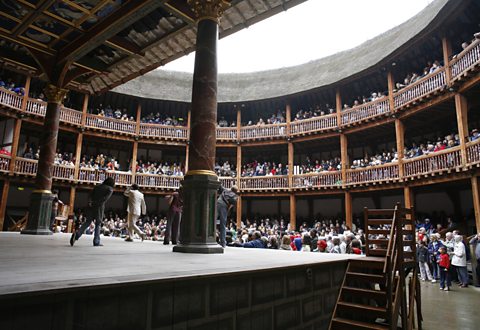
1997
Globe rebuilt
The original Globe theatre that Shakespeare part-owned was built on the Thames in 1599, a few hundred metres from the site of the new Globe.
The new theatre, ShakespeareÔÇÖs Globe, was opened in 1997 by Queen Elizabeth II, after years of fund-raising and research. It was built with reference to historical documents and archaeological evidence from the original. Like the original it sits on the riverside, though the Thames is significantly narrower than it was in Elizabethan times. In 2014, the Globe sold 368,000 tickets for its productions, proof that ShakespeareÔÇÖs plays remain big business.

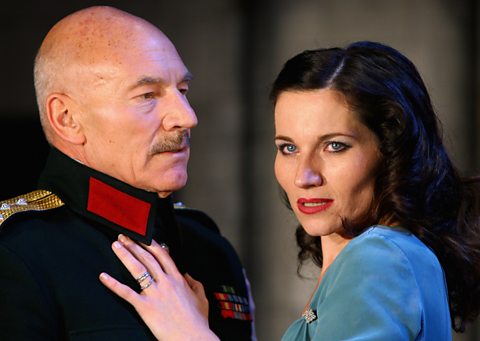
Today
World superstardom
Today, Shakespeare is regarded as EnglandÔÇÖs national playwright.
The prestige of his plays and casting of star actors reflects this. But Shakespeare may have been forgotten if his work hadn't been compiled by two fellow actors and friends, or if Garrick hadn't produced the Shakespeare Jubilee. Once in the public consciousness, the universal appeal of Shakespeare's works ensured they would be remembered. Today they hold vast cultural and financial value and his plays and sonnets are still enjoyed throughout the world.

Learn more about this topic:
A day in the life of William Shakespeare. document
A timeline showing an imagined day in the life of William Shakespeare in Stratford-upon-Avon circa 1604. Made in association with the Shakespeare Birthplace Trust.
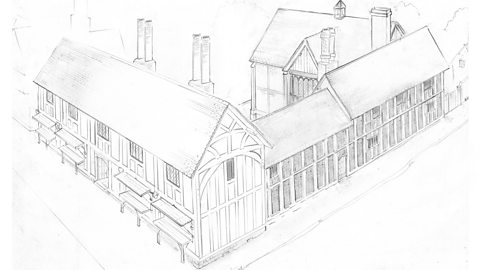
Why was Shakespeare so special? document
Michael Rosen explores the work of William Shakespeare and his fellow playwrights, and looks at why his plays in particular have stood the test of time.
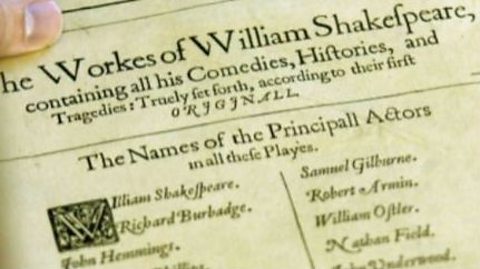
How can I learn to love Shakespeare? document
Russell T Davies and the cast of A Midsummer Nights Dream on the challenges of adapting Shakespeare and the value of letting the Bard into your life.
